Unilever Vietnam on net zero commitment in the context of COP26
 |
| Do Thai Vuong, vice president of Sustainable Development and Communications at Unilever Vietnam |
Unilever is a Principal Partner of COP26 with the ambition of reducing CO2 emissions by 100 per cent across your operations by 2030. How does this goal affect Unilever's operations and business in Vietnam?
Environmental actions and business development are interdependent and indivisible. They must always go hand in hand to ensure sustainable development for the economy, society, and the environment.
Firstly, the net-zero carbon emissions goal motivates us to reach out to more sustainable, future-fit sources of energy while we can still ensure the operational efficiency and the same product quality – or make our products even better and healthier, without compromising our customer experience.
By applying technology and innovation at our manufacturing sites in Vietnam, we are now generating waste materials into clean biomass wood pellets that have replaced 100 per cent of diesel oil, equivalent to reducing 3.5 million tonnes of CO2 in just 18 months, from 2020 to the first half of 2021.
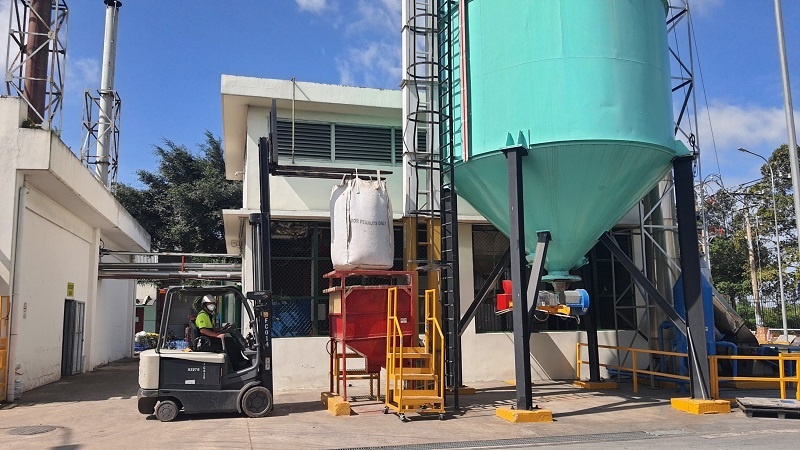 |
| Biomass clean wood pellet production furnace at Unilever Vietnam's factory |
Meanwhile, business development allows us to achieve our net-zero carbon commitment much faster and more efficiently.
Thanks to business development, we have more resources to invest in green technologies in the Vietnam supply chain, such as solar heater and energy recovery system, energy optimisation, biomass and electric material handling equipment, or LEED-certified facilities, helping our operations achieve net-zero at all manufacturing sites, warehousing operations, and facilities.
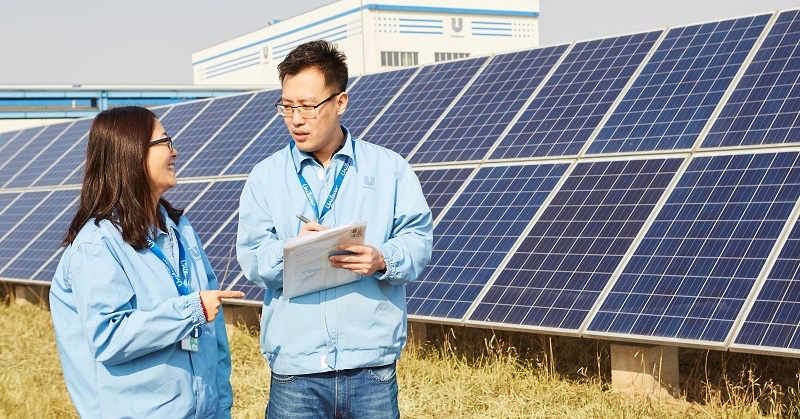 |
| Solar energy system invested by Unilever Vietnam to ensure clean and sustainable energy |
Apart from sustainable business development, is there any other motivation for Unilever to reduce greenhouse gas emissions?
Besides sustainable business development, expectations from consumers and talented human resources are also great motivation for us to take action to solve climate problems.
Consumers are becoming more demanding of brands, not only in product quality but also the responsibility in business. A good product is not only the product itself but also the values that it brings to society and the environment.
High-quality talent, besides a good working environment and career promotion opportunities, are seeking employment with purpose-led companies.
In this context, we believe that any costs associated with this additional level of ambition represent a wise investment in building our purpose-led, future-fit business, one that will be respected and trusted by future generations as much as it has been by past generations.
What specific actions has Unilever Vietnam taken to reduce carbon emissions?
On our to-do list in Vietnam, there are three key highlights that are already in motion and have made great progress so far: our plastic strategy, recycled and renewable carbon in formulations, and nature-based solutions. Our greatest focus has so far been on the first, plastic strategy.
Almost all plastics are derived from materials and substances made from fossil fuels. The process of extracting and transporting those fuels, then manufacturing plastic generates billions of tonnes of greenhouse gases.
It is estimated that Vietnam discharges more than 1.8 million tonnes of plastic waste, only 27 per cent of which is recycled, according to a 2019 report from the Ministry of Natural Resources and Environment (MoNRE).
Reacting to these realities, we have identified the plastic strategy as an important action to reduce greenhouse gases, thereby helping the government to build a carbon-free economy.
This strategy consists of two major pillars: plastic waste collection and sustainable packaging.
Regarding the first, Unilever pioneers the Circular Economy in Plastic Waste Management model in Vietnam in a public-private partnership with MoNRE and partners like Dow, SCG, Urenco, and VietCycle.
This model includes four key tasks: waste segregation at source, plastic waste collection and recycling; communication and education to raise people's awareness; technology application and innovation; and policy development.
Particularly, waste segregation at source, plastic waste collection, and recycling are important to help bring plastics back to serve the economy.
To drive this activity, we cooperated with VietCycle and Duy Tan to launch The Plastic Reborn programme. I really take pride in the double goals that the programme offers.
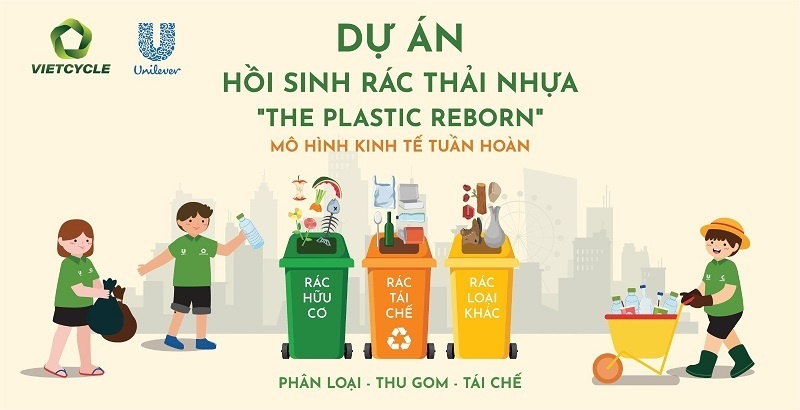 |
| The Plastic Reborn programme spearheaded by Unilever promotes environmental protection and fair, inclusive world development |
The first goal is to protect the environment by promoting the circular economy in plastic waste processing, from segregating waste at source, collecting to recycling plastic waste.
The second goal is to fulfill the sustainable development commitment to improving living conditions through prioritising female workers, the disadvantaged, the disabled, and the self-employed to participate in the value chain, providing them with information on ensuring hygienic and safe working conditions when collecting plastic waste, and labour protection equipment, thereby improving their health and living conditions, helping them to recover after COVID-19.
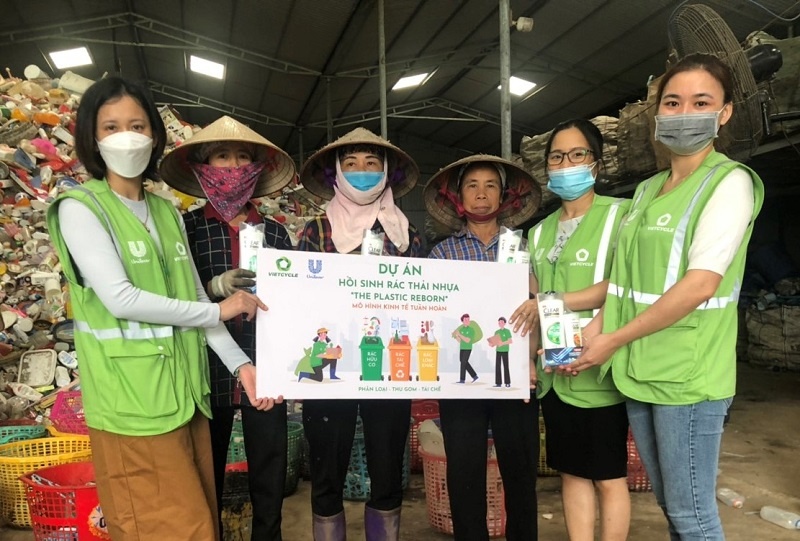 |
| The program prioritises female workers, the disadvantaged, the disabled, the self-employed to participate in the value chain to help improve living condition |
In terms of sustainable packaging, we focus on the commitment “Less plastic, better plastic, no plastic” with two specific goals to be achieved before 2025, including 50 per cent virgin plastic reduction through reducing the use of virgin plastic and increasing the use of recycled plastic and making 100 per cent of the product packaging reusable, recyclable, or biodegradable.
Specific actions towards this commitment include packaging made from recycled plastic, product concentration and compaction, or implementing and encouraging activities of product refill into old empty bottles.
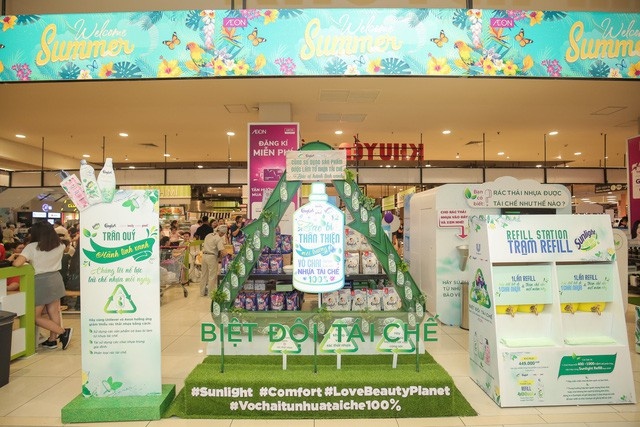 |
| Recycling and product refill are two activities Unilever brands focus on to drive sustainable packaging |
At the same time, our brands are also innovating the product packaging structure by applying science and technology to facilitate easier plastic recycling.
We have made a great progress, and have already reduced virgin plastic use by 55 per cent, made 62 per cent recyclable and 100 per cent of bottles already apply PCR.
What the stars mean:
★ Poor ★ ★ Promising ★★★ Good ★★★★ Very good ★★★★★ Exceptional
Related Contents
Latest News
More News
- Bac Ai Pumped Storage Hydropower Plant to enter peak construction phase (January 27, 2026 | 08:00)
- ASEAN could scale up sustainable aviation fuel by 2050 (January 24, 2026 | 10:19)
- 64,000 hectares of sea allocated for offshore wind surveys (January 22, 2026 | 20:23)
- EVN secures financing for Quang Trach II LNG power plant (January 17, 2026 | 15:55)
- PC1 teams up with DENZAI on regional wind projects (January 16, 2026 | 21:18)
- Innovation and ESG practices drive green transition in the digital era (January 16, 2026 | 16:51)
- Bac Ai hydropower works stay on track despite holiday period (January 16, 2026 | 16:19)
- Fugro extends MoU with PTSC G&S to support offshore wind growth (January 14, 2026 | 15:59)
- Pacifico Energy starts commercial operations at Sunpro Wind Farm in Mekong Delta (January 12, 2026 | 14:01)
- Honda launches electric two-wheeler, expands charging infrastructure (January 12, 2026 | 14:00)

 Tag:
Tag:




















 Mobile Version
Mobile Version